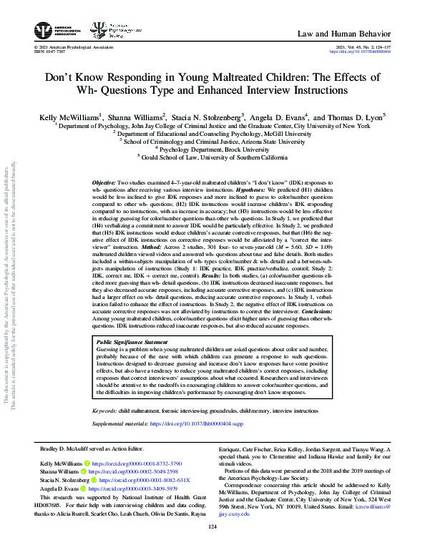
Article
84. Don't know responding in young maltreated children: The effects of wh- questions type and enhanced interview instructions.
Law & Human Behavior
(2021)
Abstract
Objective. Two studies examined 4-7-year-old maltreated children’s “I don’t know” (IDK) responses to wh- questions after receiving various interview instructions. Hypotheses. We predicted (H1) children would be less inclined to give IDK responses and more inclined to guess to color/number questions compared to other wh- questions, (H2) IDK instructions would increase children’s IDK responding compared to no instructions, with an increase in accuracy, but (H3) instructions would be less effective in reducing guessing for color/number questions than other wh- questions. In Study 1 we predicted that (H4) verbalizing a commitment to answer IDK would be particularly effective. In Study 2 we predicted that (H5) IDK instructions would reduce children’s accurate corrective responses, but that (H6) the negative effect of IDK instructions on corrective responses would be alleviated by a “correct the interviewer” instruction. Method. Across two studies, 301 4-7-year-old ( M = 5.60, SD = 1.09) maltreated children viewed videos and answered wh- questions about true and false details. Both studies included a within-subjects manipulation of wh- types (color/number & wh- detail) and a between-subjects manipulation of instructions (Study 1: IDK practice, IDK practice/verbalize, Control ; Study 2: IDK, Correct Me, IDK+Correct Me, Control ). Results. In both studies (1) color/number questions elicited more guessing than wh- detail questions, (2) IDK instructions decreased inaccurate responses, but they also decreased accurate responses, including accurate corrective responses, and (3) IDK instructions had a larger effect on wh- detail questions, reducing accurate corrective responses. In Study 1, verbalization failed to enhance the effect of instructions. In Study 2, the negative effect of IDK instructions on accurate corrective responses was not alleviated by instructions to correct the interviewer. Conclusions. Among young maltreated children, color/number questions elicit higher rates of guessing than other wh- questions. IDK instructions reduced inaccurate responses, but also reduced accurate responses.
Keywords
- child abuse,
- child sexual abuse,
- child witness,
- young maltreated children,
- wh-quesitons,
- enhanced interview questions
Disciplines
Publication Date
Winter February 10, 2021
Citation Information
McWilliams, K., Williams, S., Stolzenberg, S.N., Evans, A.D., & Lyon, T.D. (2021). Don't know responding in young maltreated children: The effects of wh- questions type and enhanced interview instructions. Law & Human Behavior, 45(2), 124-137.
